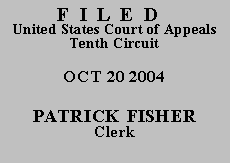

| UNITED STATES OF AMERICA,
Plaintiff-Appellee, |
|
| v. | |
| KERMIT OTIS WILLIAMS, also known
as Otis,
Defendant-Appellant. |
|
Williams was convicted by jury of conspiracy to possess with intent to distribute cocaine and cocaine base, in violation of 21 U.S.C. § 846, and was sentenced to 240 months' imprisonment and 3 years' supervised release. His conviction and sentence were affirmed on direct appeal. See United States v. Williams, 44 Fed. Appx. 362 (10th Cir. 2002). He filed his § 2255 petition on October 20, 2003, arguing ineffective assistance of counsel. In denying the petition, the district court concluded Williams' claims of ineffective assistance of counsel did not satisfy the standards contained in Strickland v. Washington, 466 U.S. 668 (1984), and that Williams' claims had no factual support or legal standing.
Williams presents the following issues as a basis for granting a COA: (1) Trial counsel was ineffective by failing to investigate and present evidence that the alleged controlled substance found in the pink house was not part of an over-all conspiracy; (2) trial counsel was ineffective by failing to investigate and present evidence that the left back panel of the yellow Mustang could not be removed with a screwdriver; (3) trial counsel was ineffective by failing to argue the applicability of U.S.S.G. § 2D1.1(b); and (4) trial counsel was ineffective by failing to inform the trial court that Federal Rule of Criminal Procedure Rule 32(c) required the court to state its reasons for enhancing his sentence pursuant to U.S.S.G. § 3B1.1(c).
After careful review of all of the filings and the record on appeal, we conclude the requirements for issuance of a COA have not been met. We are not persuaded that Williams has made "a substantial showing of the denial of a constitutional right," 28 U.S.C. § 2253(c)(2), or "that reasonable jurists would find the district court's assessment of [his] constitutional claims debatable or wrong." Slack v. McDaniel, 529 U.S. 473, 484 (2000). The burden petitioner must carry under Strickland is heavy. First, petitioner must show that counsel's performance was deficient. This requires showing that counsel made errors so serious that counsel was not functioning as the counsel guaranteed by the Sixth Amendment. See Strickland, 466 U.S. at 687. Second, petitioner must show that the deficient performance prejudiced his defense. This requires showing that counsel's errors were so serious as to deprive petitioner of a fair trial, "a trial whose result is reliable." Id. Here, petitioner has done neither.
Williams has also filed a supplemental authority letter pursuant to Federal Rule of Appellate Procedure 28(j), claiming the recent decision in Blakely v. Washington, 124 S. Ct. 2531 (2004), "supports argument that the Appellant raised within his Application and Brief in Support of Certificate of Appealability." Assuming the letter is intended to raise a new issue, i.e., that he had a Sixth Amendment right to a jury trial on his federal sentencing enhancements, we reject the issue. See United States v. Kimler, 335 F.3d 1132, 1138 n.6 (10th Cir. 2003) (refusing to address issue asserted for first time in supplemental authority letter filed pursuant to Rule 28(j)).
The request for a certificate of appealability is DENIED and the appeal is DISMISSED for substantially the same reasons as stated in the district court's order filed March 1, 2004. Williams' motion to proceed in forma pauperis on appeal is DENIED.
Entered for the Court
Mary Beck Briscoe
Circuit Judge
*.This order is not binding precedent, except under the doctrines of law of the case, res judicata, and collateral estoppel.